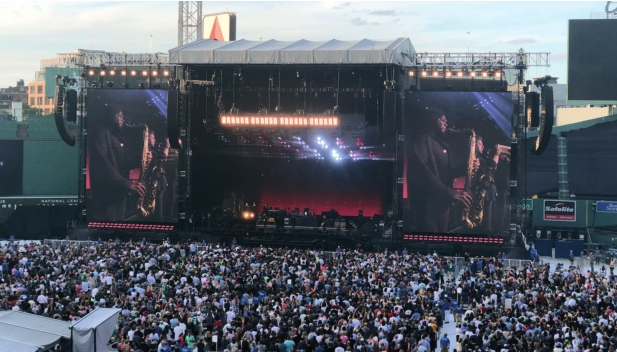
Last year's Fenway Concert Series delivered a resounding economic boost to the Fenway neighborhood, generating a total economic impact of $124.9 million. According to a recent study commissioned by Meet Boston and conducted by Tourism Economics, the concert series drew nearly 400,000 attendees to Fenway Park for 12 performances.
The 2024 lineup saw high profile artists such as Noah Kahan, Pearl Jam, Blink-182, and Foo Fighters visit the historic home of the Boston Red Sox.
Of the total $124.9 million impact, $42.9 million came from operational spending by entities such as Fenway Sports Group, Aramark, and concert promoters. These expenses covered staffing, event operations, security, and administration. The remaining $45.7 million stemmed from offsite spending by concertgoers, who filled nearby hotels, restaurants, retail shops, and entertainment venues during their visit.
This direct spending helped support 2,220 full-time and part-time jobs and generated $8.6 million in state and local taxes.
“Fenway
Park is one of the most beloved ballparks in the nation, but it’s so
much more than just home to the Red Sox. It has evolved into an
incredible multipurpose venue,” said Martha J. Sheridan, President and
CEO of Meet Boston. “The Fenway Park Concert Series is a boon for our
visitor economy and the businesses that rely on it. These concerts
generate significant visitor spending, filling restaurants and hotel
rooms while producing more shifts and wages for our industry workforce.”
Hotels
and short-term rentals took in $14.1 million from concert attendees,
while $13.2 million went to restaurants and convenience stores. Local
retailers captured $8.9 million in sales, with another $6 million spent
on transportation and $3.5 million on other amusements and recreational
activities. On average, each concert generated $10.4 million in total
economic impact, a figure that underscores the growing importance of
music tourism in the city’s economy.
Neighborhood
businesses echoed the positive impact in a press release from Meet
Boston. Haley Fortier, owner of Nathálie Wine Bar and Haley.Henry Wine
Bar, noted that concert nights often brought in more customers than a
Red Sox game.
“It
draws in a really fun group of clients who tend to pack our little wine
bar with fun energy and enthusiasm,” she said. “It’s a fantastic
addition to the neighborhood, offers significant support to local
businesses, and undoubtedly enhances the cultural vibrancy of Fenway.”
More
visitors also means a greater strain on city resources, however. At an
April 1 Red Sox pre-season community meeting, concert noise, traffic and
appropriate police staffing were top concerns for residents in
attendance. A spokesperson for the Boston Police Department at the
meeting assuaged concerns that this year’s contract would provide for a
surplus of police staffing at concerts.
A
spokesperson for Meet Boston said in an email statement that “The Red
Sox cover the costs for all required city services associated with
concerts.”
What began
in 2003 as an experiment with a single Bruce Springsteen concert has
evolved into an economic boon for the city. “Now, more than 20 years
later, it’s become a signature part of summer in Boston,” said Red Sox
President and CEO Sam Kennedy in the press release.